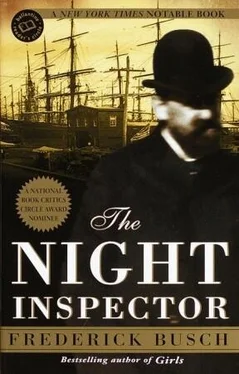“Easy,” Benny said.
To his mother: “May he take the message to the river?”
She looked at me and said, “No monkey fools?”
“Monkey shines , Ma,” Benny said.
She smiled, and her gold tooth gleamed. She sewed at home while her husband was off digging sewers for the corporation of the City of New York. She minded the children in a hard place, yet she always smiled. I made the motion of blowing her a kiss as Benny left, and she did as ever: grinned her gold tooth and waved back.
“Lovely woman,” Sam said as he stood in the street to make a note.
“Then why not omit her? Why condemn her to be captured behind your notations?”
“Billy, I propose to tell her story , not condemn her.”
“You can take that up with your author. He receives the second message.”
“What is it you’re arranging?”
“A courtesy to you. A business arrangement for me. An expedition for us all to the Tenderloin. How do you feel on the question of steamed potatoes quartered and then fried with onions to flavor a small steak?”

THE THREE OF US DINED AT CHEERIE’S, AND DURING the meal I saw Sam’s hand stray often toward the breast pocket of his mud-colored suit. That was because he wished to make a note, I knew, and I felt a cruel pleasure that civility, if only for a time, prevented him from writing down what his idol so memorably said. Clearly, I had not, at the time, understood the need to write down life or state the having witnessed it.
As the veal was brought to us, Sam said, “Will you have some of this elixir of logwood?” He held up the bottle of red wine.
M looked at the bottle and looked at Sam. “You have read it, then?”
“The masquerade of the Confidence Man? Yes, sir, I have read it.”
“A book,” its author said to me, “in which I name such an elixir.”
“Of course,” I lied.
“A great book,” Sam said. “A philosophical argumentation.”
“As usual,” its author said, “a matter of an argument between one man and nobody else. It takes two parties to argue, and whether the party of the second part — those who are not the author — be one or one thousand, that party must be a party to the contention. Otherwise, you have the lone author saying to the sky or the loamy earth beneath him, ‘Given: That man is magnificent.’ Or: ‘That man is a dog.’ ” He sat back and leaned back his head and laughed, his dark mouth open and not emitting a sound. He then shook his head and leaned forward to address his viands. Sam looked at him, then reached for his notebook, then brought his hand back around to his wineglass.
I cut my meat into very small bits and brought them on my fork, one at a time, underneath the hem of the gray silk veil.
“May I ask,” I said between bites, “how Elizabeth fares?”
“Lizzie,” he sighed. He turned to Sam. “My son,” he said, “is recently dead.”
“I am so aggrieved on your account,” Sam said. “I wrote of the matter. In the Advertiser?”
M set his implements down. He rubbed at his beard and then tugged it, then tugged it again. “You are the gentleman who wrote of my Malcolm’s staying out late?”
Sam said, “It was known to many.”
“Needed it be said? And how late? And how often? And why a matter of concern? To Lizzie? To me? To the both? To the readers in Boston who do not read me but do read of me?”
“It is history, recorded and observed, sir.”
“And it needs to be said?”
“I do need generally to say it, sir. I believe it ought to be.”
“Sharper than a serpent’s tooth,” he murmured, pulling down his whiskers. “And why do you ask in your paper how Malcolm came by the pistol? Should he not have had one, he a military man? Your article seems to suggest an impropriety. Should we have prevented him from arming himself? Is it now that soldiers of the National Guard ride into danger unprotected and unarmed? There had been rumors of their riding into danger in the West. Now I sit at my desk and, as I work, I look up at its bookcase, and on the shelves, behind the glass doors, I see recollections of the War. Each is by a military commander. Each makes no mention of casting aside weaponry but, rather, of gathering together all that money may buy or that may be impounded or borrowed.
“And is there some speculation that something was said that night, at the door, at the late hour, by my wife, who admitted him to the house? Or that something may have been said by me early in the day or in the week or month before his late arrival, or even afterward, through the locked door to his room?”
Sam looked miserable. “Sir,” he said, “about the weapons: My editor thought it required saying, and so I said it. He is, if you know our paper, keen on the matter of civilians handing over their arms. I meant nothing subversive by it. I was pained by your pain, and still am. In no manner am I qualified to judge you as man or as parent to a son. I regard you too highly ever to trifle with your private feelings. I am grateful to receive their fruits, in your work, and I sorrow for you, and it is all.”
“Sam is your name?”
“Yes, sir. Sam Mordecai.”
“Yes,” he said. He put his fingers to his eyes and rubbed gently at the closed lids. I have never been in the presence of someone whose eyes seemed so uncomfortable. When he had finished rubbing, they looked threaded through with bloody vessels, and almost unseeing. His face wore a bland expression from that moment through much of the night. “Mordecai, you say?”
“Yes,” Sam said warily.
M placed his hand above Sam’s dinner plate. “Shake, then. We may speak of it again. We may not. But we’ll act as friends. It may be that we’ll be friends. We’ll be civil, though. A night is a long time to be together if we aren’t.”
I thought that Sam might weep for relief and for pleasure. “I’d always do my best for you, sir,” he whispered.
M looked in my direction and raised his brows, then shook his head. “I look at you , shipmate, and I see the screen that is set over everything.”
“Pleased to be of some use, then,” I said, but more bitterly than I intended. He sat back as if I had gestured with menace. “I am being humorous,” I said.
“You are not, I think, although I think you mean to be. It is my discourtesy. A man should not be employed by another as his emblem. Listen to us, then. We’re all apologizing to one another for the wrongs in the world and the flaws in heaven. We’ll have all the ills of the universe renounced by the time Mr. Cheerie brings us pies and puddings. And a tot or two more of this wine. We’ll toast to right navigation, shall we? To the poor fellows who forgot how to put a bight in a hawser, or who forgot how to snug a hawser on a bollard. Their coal barge,” he said, shaking his head, “drifted loose. It happens. It shouldn’t. And the tide met the current in a grievous chop. And over went a small mountain of coal. And down went the barge, for having shipped too much river aboard. And now we’ve a tidy navigational hazard on the waterway. It’s like making your way upriver in what we think of as actual life,” he said.
I waited for him to explain, but he drank at his wine.
“Do you know the Tenderloin?” I asked him, pouring out the last of the bottle.
“I have been to places on the western side of the city,” he said. “It is not where I would take Elizabeth and the girls for a stroll. Do you mean brothels and gambling dens, dance halls, saloons?”
Читать дальше













